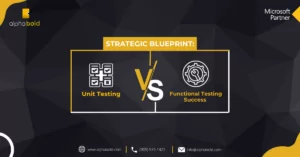Understanding Project Methodologies for Your Next Software Implementation

Muhammad Umar Sultan Sheikh
Introduction
Modern-day users are often perplexed by the various project management methodologies, including Agile, Waterfall, Kanban, Scrum, and Lean. It’s a common challenge to distinguish between these approaches, and confusion can arise when Lean and Scrum are mistakenly associated with Agile.
In this blog post, we’ll unravel the intricacies of these methodologies, clarifying their core differences. By the end of this read, you’ll have a comprehensive understanding of each, enabling you to make well-informed decisions about which approach best suits your projects.
Project Management Methodologies: Waterfall
In the waterfall project management methodology, the project is divided into linear and progressive stages, and every phase depends on the previous phase’s completion. In this approach, managers need to follow the below-listed steps.
- Requirement gathering: In this stage, the POC (point of contact) contacts the client to set concrete requirements.
- Requirement Analysis: It demonstrates the project’s models, schema, and business rules.
- Designing: The team starts designing the software architecture.
- Development: The team works on module development and integrations at this stage.
- Testing: Next comes testing; the professionals start analyzing and testing the product to ensure the delivery of an optimal system.
- Support: In this phase, the team provides support by installing, migrating, and maintaining the entire system.
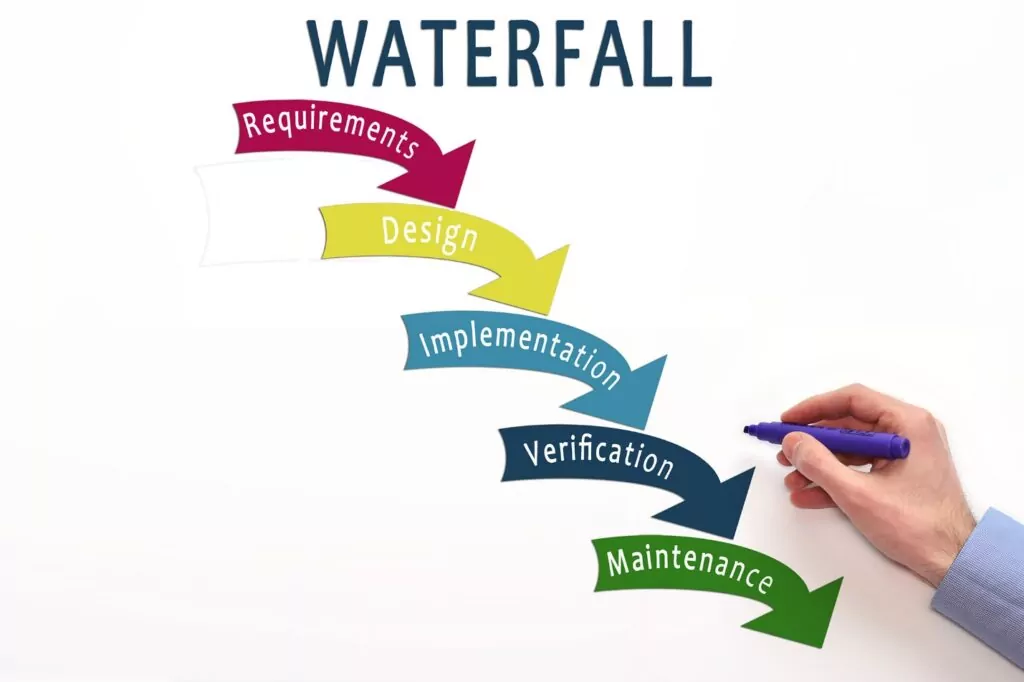
Why Use Waterfall?
People tend to opt for the Waterfall methodology when project requirements are clear, leaving no room for confusion or change requests. Managers, especially those well-versed in the technology involved, find this model suitable for relatively small projects with limited budgets.
For example, Waterfall project management methodology in construction projects has become increasingly famous due to its structured approach and clarity in sequential tasks. In the construction industry, where requirements are often well-defined from the outset, and changes during the project can be costly and disruptive, the Waterfall methodology offers a clear roadmap. It enables project managers to meticulously plan and execute each phase, ensuring a smooth progression from one stage to the next. The Waterfall methodology is known for its simplicity and ease of implementation. However, it may pose challenges in measuring progress, especially in larger projects. Additionally, this model only readily accommodates change requests.
Project Management Methodologies: Agile
Agile is a method that splits a project into several phases. It requires continuous communication with the stakeholders for improvement at every stage. Unlike waterfall, this project management methodology promotes continuous development and testing throughout the project lifecycle. Agile involves four main principles:
- The team interacts with the stakeholders over the processes and tools.
- The team must have comprehensive documentation of a product under development.
- The customer collaborates over the contract negotiation.
- Responding to change over following a plan.
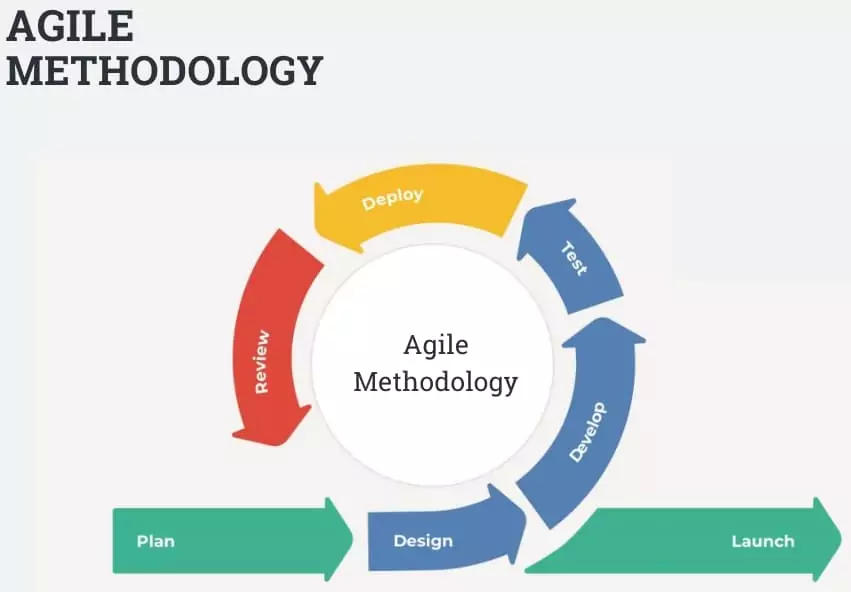
Why Use Agile?
Agile is faster than waterfall methodology, focusing on the first progress deployment in an initial couple of weeks to demonstrate project progress. Moreover, customer satisfaction is a crucial part of agile methodology; it evolves around the customer, and the client is engaged at every step to get updates and verify the requirements. Additionally, it develops a culture that focuses on productivity due to its transparent nature and clear goals.
The software development industry is most famous for using Agile methodology for project management. Agile was initially developed for software development projects to enhance flexibility, adaptability, and collaboration, making it a highly popular choice in the technology sector. However, over time, Agile principles and practices have been adopted and adapted by various other industries beyond software development due to its effectiveness in managing complex and evolving projects.
Project Management Methodologies: Scrum
Scrum represents a set of well-defined procedures and roles known as Sprints. It embodies the Scrum project management methodology for efficient team collaboration. Moreover, the process encapsulates the requirements prioritized by the project’s client, considering a balance of value and cost. The Scrum team consists of the following roles:
- Scrum Master: The individual who is responsible for the implementation of the rules and processes. Additionally, they administered daily Scrum coaching, mentoring, and training to the team if required.
- Product owner: A PO is someone who illustrates stakeholders and customers.
- Team: The team includes professionals like developers, QA, PM, etc.
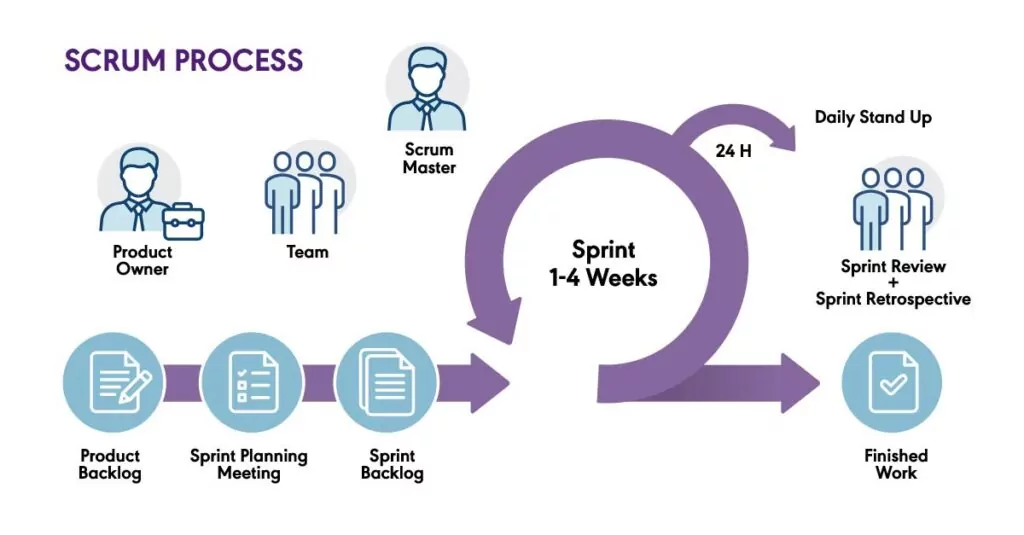
Why Use Scrum?
Scrum is one of the most famous agile project management methodologies due to its trusted framework. It is easily scalable as the sprints make it more convenient for the team to work. Client satisfaction is another factor that puts Scrum on top of the list because the stakeholder sets the client expectations after the sprint closure. Additionally, change requests can be accommodated at any stage.
Similar to Agile, the software development sector prominently adopts the Scrum methodology for efficient project management. Initially designed to streamline software development endeavors, Scrum has garnered extensive recognition owing to its ability to augment productivity, encourage collaborative efforts, and flexibly adapt to changing project requisites. While rooted in software development, the triumph and demonstrated benefits of Scrum have driven its integration into various sectors. Its application now transcends the technological realm, spanning domains like marketing, education, healthcare, and more.
Tap Into Our Expertise Today!
Unlock unmatched project management success with AlphaBOLD's specialists.
Discover ExpertiseProject Management Methodologies: Kanban
One frequently utilized framework is Kanban, which allows project managers to oversee and track their projects efficiently. The main goal of the Kanban Framework is to promote project transparency and team member participation by displaying the entire project on boards. The Kanban framework stands out among other agile techniques for its flexibility as it fits any organizational structure.
Basic tenets of the Kanban methodology:
- Start with the current process: It strongly emphasizes implementing incremental improvements; the team starts with the existing workflow and continually enhances it.
- Limit the current tasks: Understanding your capacity is critical; taking on more than the team can do will simply result in time loss and harm the project.
- Recognize and uphold current obligations: While working within the limitations of the current configuration, efficiency is increased.
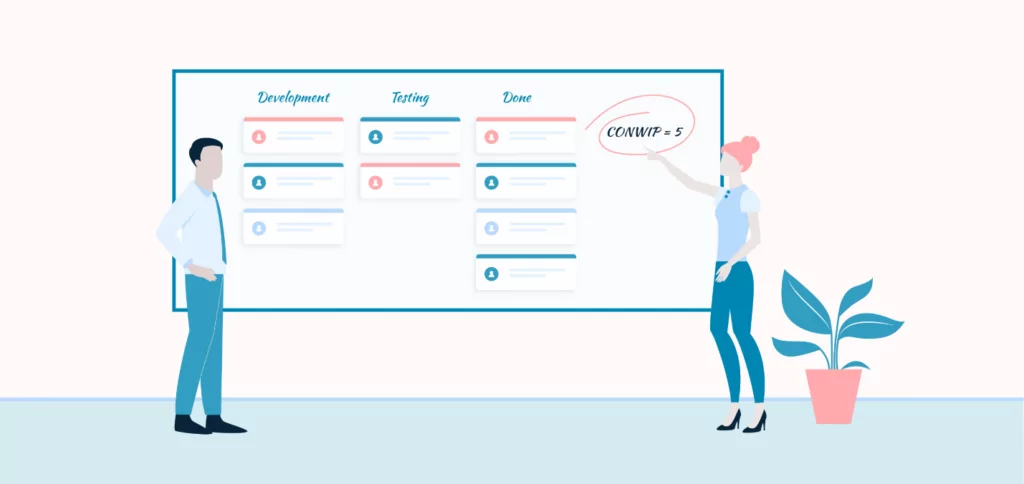
Why Use Kanban?
The primary advantage of implementing the Kanban project management methodology for workflow optimization is its capacity to streamline workflow and project management without necessitating alterations to the organizational structure. The development team can confidently deliver optimal value to the business, particularly when the product owner prioritizes crucial tasks at the top of the backlog. Consequently, the rigid constraints of fixed-length iterations, as observed in Scrum, are not obligatory.
The Kanban methodology originated in manufacturing but found significant traction and adaptation in software development due to its effectiveness in visualizing workflows, optimizing processes, and enhancing productivity. Over time, its success and benefits have led to its adoption in various other industries beyond software development, including marketing, project management, healthcare, and more.
Project Management Methodologies: Lean
Lean is a concept and a discipline that, at its foundation, aims to make information widely available so that the involved parties can make informed decisions to maximize customer value.
Five guiding principles for implementing lean:
- Value: Recognize what consumers value in a product or service.
- Value Stream: The concept of maximizing value and eliminating inefficiencies across the entire process, from design to production, is called a value stream.
- Flow: All production processes are in sync with one another.
- Pull: The definition of “pull” states that nothing is processed before it is required, enables flow, and shortens delivery cycles.
- Perfection: Frequently put in the problem-solving process as you relentlessly aim for perfection.
Why Use Lean?
The Lean methodology offers numerous benefits, establishing it as a valuable approach across various industries. By minimizing waste, enhancing efficiency, and optimizing resources, Lean fosters cost savings and increased profitability. It promotes a culture of continuous improvement, empowering teams to identify and resolve inefficiencies. These benefits are exemplified in the multitude of ways industries across the globe are utilizing it.
One such notable example is the utilization of Lean project management methodology for waste reduction. By implementing Lean principles, organizations can streamline processes and reduce unnecessary steps, ultimately resulting in a reduction of waste and improved resource utilization.
Within the realm of waste reduction projects, the Lean methodology provides a structured framework for identifying, analyzing, and mitigating different forms of waste. Whether it’s minimizing excess materials, optimizing energy consumption, or enhancing workforce utilization, Lean offers a systematic approach. The primary goal is to enhance efficiency, reduce costs, and contribute to a more sustainable and environmentally friendly operation.
Schedule a consultation with AlphaBOLD now!
Whether it's Agile, Waterfall, or Lean, our experts have got you covered.
Empower Your ProjectsConclusion
Navigating the intricate web of project management methodologies can be daunting. As we’ve seen, methodologies like Waterfall, Agile, Scrum, Kanban, and Lean each present distinct principles and advantages suitable for different project types and industry sectors. But while understanding the basics is essential, expert guidance can significantly bolster the implementation and success of any chosen methodology.
This is where AlphaBOLD shines. Our experts are not just acquainted with these methodologies – they’re highly trained and seasoned in each one. With their extensive experience across diverse industry projects, AlphaBOLD specialists bring a nuanced understanding of how each methodology can be tailored to meet specific project needs. This means, regardless of your chosen approach, you’re backed by expertise that ensures smooth execution, timely deliveries, and optimal outcomes.
When you collaborate with AlphaBOLD, you’re not just gaining support; you’re leveraging a reservoir of knowledge and proficiency that can adapt and align with any project methodology. Whether you’re charting a well-defined path with Waterfall or navigating the flexible terrains of Agile and Scrum, our experts stand ready to guide, optimize, and drive your projects to fruition.
Explore Recent Blog Posts


